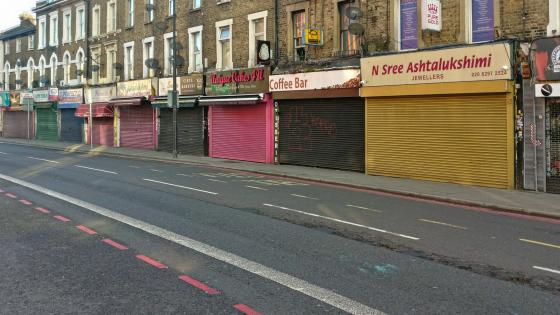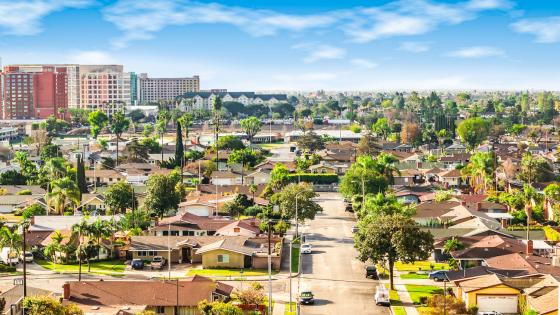The COVID-19 pandemic is a deadly threat to human life on our planet. In a seminal study, Scheidel (2017) poses the argument that catastrophic events act as a ‘Great Leveler’ which non-discriminatorily wipes out millions of lives globally in a similar way to the Black Death, Russian revolutions, and World Wars.
Early indications of the effects of COVID-19 on mortality in the UK suggest deaths have been consistently higher in London than in the rest of the country. Yet, it is widely known that cities are the most economically unequal places (Glaeser et al. 2009). A closer examination of the data reveals a nuanced pattern about the propensity of different groups of people to die from COVID-19. It appears that the chances of survival from the COVID-19 pandemic are unequally distributed across the UK population and associated with pre-pandemic socioeconomic inequalities. History tells us that deepening inequalities in pandemic periods have consequences for future socioeconomic destabilisation (Turchin 2020).
Using a Culture Based Development (CBD) spatial analytical approach (see Tubadji 2012, 2013), we explored COVID-19 mortality rates across England and Wales in the early part of the pandemic (3 January 2020 to 27 March 2020). We show that the early part of this pandemic seems to have disproportionately affected the economically and socially vulnerable. Most vulnerable to COVID-19 appear to be groups of citizens who were previously subject to unconscious economic and cultural discrimination in areas that are known to be ‘left behind’. Our results suggest that the effects of cultural (ethnic) discrimination on mortality due to COVID-19 is five times greater than the economic effect, and deaths were 19 percentage points higher in pro-Brexit areas.
Figure 1 shows that the distribution of COVID-19 mortality rates is greater in areas that voted for Brexit. We also found that the COVID-19 death toll is consistent with the geography of economic deprivation and with the geography of ethnic diversity. While ethnic diversity predicts COVID-19 death rates in the middle and eastern parts of the UK, the north and south-west regions seem to have a coincidence of deprivation and greater death toll. Our modelling reveals that economic and cultural class cleansing is occurring during the COVID-19 pandemic at a low level of consciousness. These results are particularly relevant when mapped against the pre-pandemic geographies of deprivation.
Figure 1 Covid-19 deaths (%) and Brexit vote
Notes: The figure shows histograms of COVID-19 deaths for regions with below and above Brexit mean vote for the period 3 January – 27 March.
Source: ONS Data on COVID-19 deaths.
Geographies of deprivation in the UK and COVID-19
Hirschman and Rothschild (1973) argued that economic inequality leads to unrest through ‘the tunnel effect’, whereby economic unevenness and increasing inequality are bound to create feelings of being ‘left behind’ (p. 551) which then lead to social unrest. Subsequent theoretical work and empirical evidence for the tunnel effect is provided in the work of some leading cultural economists (Benabou and Tirole, 2006, 2011; Alesina and Fuchs-Schündeln 2007; Acemoglu and Robinson 2010, 2012; Passarelli and Tabellini 2013), political economists (Scheve and Stasavage 2006), and other recent high-profile contributions (Kerr 2014). The left-behind feeling was recently recalled in studies of the geographies of deprivation in the UK in relation to the Brexit vote.
Spatial inequalities in the UK, termed geographies of deprivation, have been one of the most widely debated explanations for the Brexit vote (Rodríguez-Pose 2018; McCann 2016, 2019; Lee et al. 2018). According to these studies, deprived areas experience more precarious socioeconomic conditions and higher levels of uncertainty and stress, and therefore were feeling left-behind and expressed their dissatisfaction with the growing inequality through voting for Brexit.
Higher levels of uncertainty and stress are also related to having lower immune systems (Bray et al. 2008). COVID-19 deaths are related to underlying health conditions and the onset of multimorbidity in the UK is already known to occur 10-15 years earlier for people living in the most deprived areas compared with people living in the most affluent areas (Barnett et al. 2012). Thus, the death toll from COVID-19 will deepen health and morbidity inequalities relative to the pre-pandemic period.
These health inequalities may further strengthen the spatial pattern of feelings of discontent and be exacerbated by spatially asymmetric economic opportunities driven by the industrially related consequence of the implementation of the Brexit policy (Los et al. 2017). Therefore, we argue that the current COVID-19 pandemic is likely to exacerbate and deepen existing inequalities on the brink of an economic shock at the end of the Brexit implementation period.
Cultural and economic discrimination by the Great Leveller
Culture Based Development is a research paradigm that allows for the identification of pockets of faster growing inequalities. When applied to COVID-19 morbidity, the results reveal that this death rate is nurtured by socioeconomic inequalities that existed in the pre-pandemic period and specifically factors related to economic and cultural discrimination.
From an economic discrimination perspective, the death toll in the UK is concentrated in more deprived areas, with a one percentage point statistically significant difference in mortality rates between more and less deprived areas. The number of SMEs in a region seems to be negatively associated with the COVID-19 death rate, suggesting that COVID-19 had a weaker effect in economically prosperous places.
From a cultural discrimination perspective, the areas with greater than average concentrations of non-White populations experienced a statistically significant five percentage point higher death toll. This finding is consistent with reports from the US (Arnold et al. 2020, Baldwin 2020) and elsewhere, where Black and other non-White populations are experiencing greater exposure, contagion, and death rates than their White counterparts.
Further to this evidence for economic and cultural discrimination, we find that the pre-pandemic percentage of lung cancer deaths in a region predicts COVID-19 mortality in a statistically significant positive manner, suggesting that health predisposition strongly affects the death toll. A similar but even stronger statistical corroboration is found between the pro-Brexit vote share and COVID-19 deaths. Covid-19 deaths were 19 percentage points greater in pro-Brexit areas relative to areas that voted to remain.
Thus, the COVID-19 outbreak seems to have hit harder those places that were economically more deprived and culturally more diverse, which are the left behind places that already signalled their discontent through voting for Brexit. Previous empirical and theoretical literature suggest that these results should be taken as an important alert and a call for interventions to reduce existing levels of inequality.
Policy alert for pro-Brexit areas
Existing links between the sentiment of being left behind and other socioeconomic factors in the context of radical voting have been documented for the UK (Tubadji et al. 2020b) and the Netherlands (Tubadji et al. 2020a).1 Those papers build on Hirschman and Rothschild’s (1973) and Tiebout’s (1956) models and show that existing deprivation and a lack of outmigration among the autochthonous population signals a perception of increasing deprivation, which exacerbates the feeling of being left behind, and thus explains the UK’s pro-Brexit vote.
In short, we find that the COVID-19 outbreak seems to have hit harder those UK places that are already economically more deprived and culturally more diverse. Our results suggest that the effects of cultural (ethnic) discrimination on mortality due to COVID-19 is five times greater than the economic effect, and deaths were 19 percentage points higher in pro-Brexit areas. The pandemic is likely to exacerbate the real and perceived deprivation in areas which already have signalled feelings of left behind places, expressing their discontent through voting for Brexit. Moreover, this aggravation of the perceived deprivation is happening on the brink of an expected economic shock at the end of the Brexit implementation period
So, if the COVID-19 pandemic deepens inequalities in already deprived areas, widening the gap on the basis of economic and cultural divides, then the feelings of perceived deprivation and being left behind are bound to escalate. Health deprivation, compounded by further fiscal economic blows due to the implementation of Brexit, is highly likely to result in greater protests (Ponticelli and Voth 2020).
The Culture Based Development (CBD) analytical approach can help policymakers identify how the path-dependent geography of cultural and economic discrimination predicts the locations that will have higher COVID-19 morbidity rates. The CBD approach also offers suggestions on how this information can be used to identify places that are in danger of falling into development traps where local economic stagnation may occur. Timely efforts for alleviating inequality in these regions might be a way to prevent further socioeconomic damage to the country and build greater socioeconomic resilience across the UK (see Martin 2012, Martin and Gardiner 2019, Furman 2020).
References
Acemoglu, D and J A Robinson (2010), “Why is Africa poor?”, Economic history of developing regions 25(1): 21-50.
Acemoglu, D and J A Robinson (2012), Why nations fail: The origins of power, prosperity, and poverty, Crown Books.
Alesina, A and N Fuchs-Schündeln (2007), “Goodbye Lenin (or not?): The effect of communism on people's preferences”, American Economic Review 97(4): 1507-1528.
Arnold, D, W Dobbie and P Hull (2020), “Measuring Racial Discrimination in Bail Decisions”, Becker Friedman Institute, Working paper No. 2020-33.
Audretsch, D B and M Fritsch (2002), “Growth regimes over time and space”, Regional Studies 36(2): 113-124.
Baldwin, R (2020), “The COVID-19 upheaval scenario: Inequality and pandemic make an explosive mix”, VoxEU.org, 15 March.
Barnett, K, S W Mercer, M Norbury, G Watt, S Wyke and B Guthrie (2012), “Epidemiology of multimorbidity and implications for health care, research, and medical education: a cross-sectional study”, The Lancet 380(9836): 37-43.
Benabou, R and J Tirole (2011), “Identity, morals, and taboos: Beliefs as assets”, The Quarterly Journal of Economics 126(2): 805-855.
Benabou, R and J Tirole (2006), “Belief in a Just World and Redistributive Politics”, The Quarterly Journal of Economics 121(2): 699-746.
Bray, C, D S Morrison and P McKay (2008), “Socioeconomic deprivation and survival of non-Hodgkin lymphoma in Scotland”, Leukemia and lymphoma 49(5): 917-923.
Furman, J (2020), “Protecting people now, helping the economy rebound later”, In R Baldwin and B Weder di Mauro (eds.), Mitigating the COVID Economic Crisis: Act Fast and Do Whatever It Takes, a VoxEU.org eBook, CEPR Press.
Glaeser, E L, M Resseger and K Tobio (2009), “Inequality in cities”, Journal of Regional Science 49(4): 617-646.
Hirschman, A O and M Rothschild (1973), “The changing tolerance for income inequality in the course of economic development”, The Quarterly Journal of Economics 87(4): 544-566.
Kerr, W R (2014), “Income inequality and social preferences for redistribution and compensation differentials”, Journal of Monetary Economics 66: 62-78.
Lee, N, K Morris and T Kemeny (2018), “Immobility and the Brexit vote”, Cambridge Journal of Regions, Economy and Society 11(1): 143–163.
Los, B, P McCann, J Springford and M Thissen (2017), “The mismatch between local voting and the local economic consequences of Brexit”, Regional Studies 51(5): 786-799.
Martin, R and B Gardiner (2019), “The resilience of cities to economic shocks: A tale of four recessions (and the challenge of Brexit)”, Papers in Regional Science 98:1801-1832.
Martin, R (2012), "Regional economic resilience, hysteresis and recessionary shocks", Journal of Economic Geography 12(1): 1-32.
McCann, P (2016), The UK regional-national economic problem: Geography, globalisation and governance, Routledge.
McCann, P (2019), “Perceptions of regional inequality and the geography of discontent: Insights from the UK”, Regional Studies 54(2): 256-267.
Passarelli, F and G Tabellini (2013), “Emotions and political unrest”, CESifo Working Paper Series No. 4165.
Ponticelli, J and H J Voth (2020), “Austerity and anarchy: Budget cuts and social unrest in Europe, 1919-2008”, Journal of Comparative Economics 48(1): 1-19.
Rodriguez-Pose, A (2018), “The revenge of the places that don’t matter (and what to do about it)”, Cambridge Journal of Regions, Economy and Society 11(1): 189-209.
Scheidel, W (2017), The great leveller. Violence and the history of inequality from the stone-age to the twenty-first century, Princeton: Princeton University Press.
Scheve, K and D Stasavage (2006), “Religion and preferences for social insurance”, Quarterly Journal of Political Science 1(3): 255-286.
Tiebout, C (1956), “A pure theory of local expenditures”, Journal of Political Economy 64(5): 416-424.
Tubadji, A (2012), “Culture-Based Development: Empirical Evidence for Germany”, International Journal of Social Economics 39(9):690-703.
Tubadji, A (2013), “Culture-Based Development: Culture and Institutions Economic Development in the Regions of Europe”, International Journal of Society Systems Science 5(4):355-391.
Tubadji, A and P Nijkamp (2019), “Cultural attitudes, economic shocks and political radicalization”, Annals of Regional Science 62(3): 529-562.
Tubadji, A, M Burger and D J Webber (2020a), “Geographies of Discontent and Cultural Fiscal Policy in the Netherlands”, mimeo.
Tubadji, A, T Colwell and D J Webber (2020b), “Voting with Your Feet versus Brexiting: The Tale of Those Stuck Behind”, mimeo.
Tubadji, A, D J Webber and F A Boy (2020), “Cultural and Economic Discrimination by the Great Leveller: The COVID-19 Pandemic in the UK”, Covid Economics: Vetted and Real-Time Papers 13.
Turchin, P (2020), “Coronavirus and Our Age of Discord”, Cliodynamica - A Blog about the Evolution of Civilizations, 05 April.
Endnotes
1 Similar links between socioeconomic development and ultra-right voting exist for Greece (Tubadji and Nijkamp 2019).






